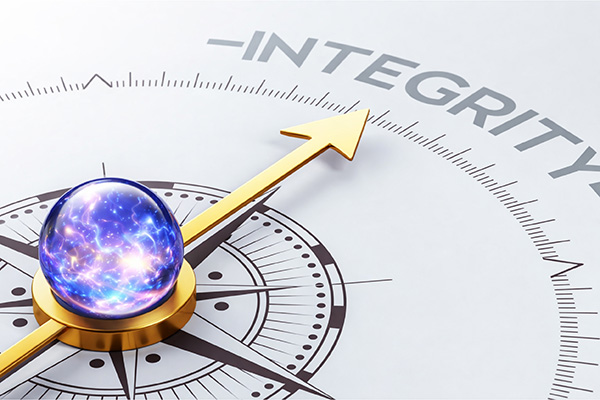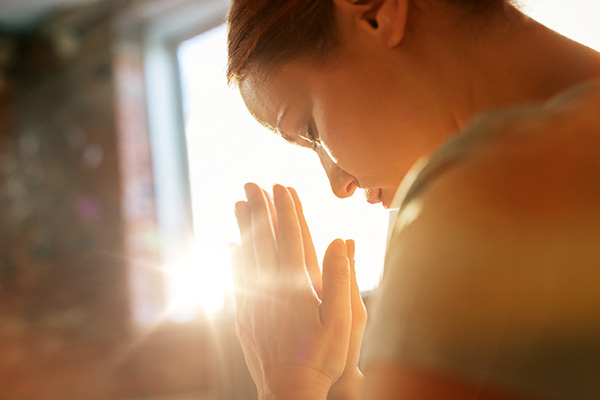spiritual principles
Why Integrity Is Non-Negotiable In Psychic Reading
 I often come across psychic-related news stories that just baffle me as a spiritual person. They all have one thing in common: regular people who lose a lot of money, often in cryptocurrency scams, after trusting a fake psychic or fortune-teller.
I often come across psychic-related news stories that just baffle me as a spiritual person. They all have one thing in common: regular people who lose a lot of money, often in cryptocurrency scams, after trusting a fake psychic or fortune-teller.
In a bunch of cases recently, people were encouraged to invest in cryptocurrencies or other investment schemes over the course of weeks or months. Whenever they had any doubts, they were reassured and encouraged to keep investing.
But when they tried to withdraw their money, they found that it was all gone. The money was never invested, the platforms were fake, and the people they had trusted were no longer available.
These stories often end with victims feeling embarrassed and confused about how they got drawn so deeply into such a scam.
The so-called “psychic” usually operated under a fake name. They weren’t linked to any reputable platforms, and had no online presence or reputation to speak of. They usually disappear as soon as the authorities get involved.
What bothers me most about these stories is the lack of integrity and the misuse of trust. No ethical psychic practitioner is going to advise clients that way.
My first reaction is always: How can someone do this to another person? Then, I can’t help but also wonder: How could someone be so gullible and irresponsible to follow such questionable financial advice?
Ask Spirit For Patience This Holiday Season
The holidays are supposed to be a time of joy, togetherness, and celebration. But for some of us, it can also be a time of tension, distress, and intense emotions.
Instead of being a time of gratitude, love, and connection, for some of us the holidays mark the resurfacing of old family conflicts, unresolved tensions, and the weight of others’ overwhelming expectations or criticisms.
These challenges often lead to frustration, sadness, anger, or feelings of being overwhelmed, turning what should be a time of love and belonging into one that underscores where our relationships with loved ones are most strained.
At this point, asking spirit or your higher power to help you cultivate the virtue of patience becomes a powerful way to stay grounded and centered.
Patience isn’t just about enduring difficult moments; it’s about being aware of those moments and choosing to respond with grace and dignity rather than impulsively. When tensions rise — perhaps during a family dinner where conversations may become heated or awkward — it is easy to fall back on old patterns and habitual responses. Asking for spiritual support and protection in these moments, however, can provide a higher perspective and an empowered response.
Whether it’s through a silent prayer, a few deep breaths, whispering your favorite mantra, or simply making a conscious call for help in your mind, spiritual presence can help you pause, step back, ground and center, and approach the situation calmly and with more compassion — for yourself and others.
Be The Light That Darkness Cannot Touch
 The nightmare continues every day. The very thing we fear the most has come to look us right in the face, staring in our eyes. This little imp taps us on the shoulder, reminding us of all the stupid things we did, all the hurtful things, how we messed up, time after time.
The nightmare continues every day. The very thing we fear the most has come to look us right in the face, staring in our eyes. This little imp taps us on the shoulder, reminding us of all the stupid things we did, all the hurtful things, how we messed up, time after time.
We messed up time again, no one agrees with us, we are reminded that “they” are so much smarter, did things exactly right every time.
We are at a turning point. We can give up, turn, run for the hills to hide, but still there is the demon of fear lingering around the deep recesses of our mind.
Surely this little devil of fear tells us we can see how we don’t deserve to reach our dreams, or accomplish our goals.
Stand back! Truly look at everything from all sides. Become like an eagle, or an owl, or a hawk, with eyes that see far beyond the surface where the heart lies.
Try to be kind and loving. Put your mind in the thoughts of being kind, being positive, no matter how much doing so lays open our heart for others to stomp on, even though many others will think you have lost your mind.
When we try with all our hearts to do something toward our dream, with love, with pure knowledge, we are listening to spirit. Then we gain strength, we gain courage, we pass over the top of the highest mountain to reach the other side. Let this outlook enlighten your heart, mind and soul toward a new attitude, for a new beginning.
The Mysteries, Messages And Magic Of Meteorites
 Meteorites have long intrigued me as one of the great mysteries of the universe. They’ve fascinated me for years, not only because they survive their fiery descent through Earth’s atmosphere in such an epic and awe-inspiring way, but also because of their extraordinary origins.
Meteorites have long intrigued me as one of the great mysteries of the universe. They’ve fascinated me for years, not only because they survive their fiery descent through Earth’s atmosphere in such an epic and awe-inspiring way, but also because of their extraordinary origins.
Recently, I acquired a small piece of meteorite from Campo del Cielo, a renowned celestial fragment discovered by Spanish explorers in Argentina in 1576. It now graces my altar with it cosmic presence, enhancing the energy of my home and sparking some fun conversations!
Their origins are diverse. Some come from asteroids or comets, others from planetary bodies.
However, what I find especially captivating about these “messengers from space” is that they offer more than just scientific insights into the birth of our solar system.
Even more compelling is the spiritual and esoteric significance they’ve held throughout human history. Across time and tradition, they continue to be revered as powerful allies in spirituality and metaphysics.
Many lithotherapy practitioners believe meteorites are gifts from the divine, reminding us of our eternal connection to the cosmos. They are symbols of spiritual awakening, transformation, and divine wisdom.
Ancient civilizations used them for meditation and healing, to connect with higher realms, and to catalyze personal growth. Because they are quite literally “otherworldly,” meteorites offer us a cosmic perspective and invite us to reflect on our place within the grand tapestry of existence.
Why Our Souls Cannot Afford A Lack Of Empathy
 Life has a way of weaving unexpected lessons into even the most ordinary or practical situations. Sometimes what begins as a business transaction or a casual encounter becomes a doorway into something far more meaningful, a reminder of the deep human connection we are all longing for and the healing power of simple empathy.
Life has a way of weaving unexpected lessons into even the most ordinary or practical situations. Sometimes what begins as a business transaction or a casual encounter becomes a doorway into something far more meaningful, a reminder of the deep human connection we are all longing for and the healing power of simple empathy.
I recently found myself in a situation that reminded me of this truth in the most unexpected way.
I am in the process of selling two homes in different states, which has been quite challenging. Anyone who has sold property knows how stressful and complicated it can be…much less two properties at the same time!
Over the past couple of months I had spoken to quite a few realtors and interested buyers. One agent initially showed strong interest in one of my homes. He seemed genuinely eager, but then he suddenly disappeared without explanation. My calls and messages went unanswered. While I did not sense that he had completely lost interest, I could not wait indefinitely and had to continue moving forward with my plans.
Still, I could not shake a quiet concern for him, as though something more was happening behind the scenes, and the feeling carried a weight of unease.
Several months later, he reached out unexpectedly, asking if I had sold my property yet. He apologized for vanishing and then explained the reason for his absence. He had been in a serious car accident and had spent time in the hospital. His injuries required surgery, and bolts had been placed in his foot. Now he was in physical therapy, learning to walk again.
The Spiritual Power Of The Words You Speak
 Have you ever stopped to truly consider the words you speak? Most of us talk all day, every day, without realizing the impact of each syllable we send out into the world.
Have you ever stopped to truly consider the words you speak? Most of us talk all day, every day, without realizing the impact of each syllable we send out into the world.
Words are much more than just communication sounds. They’re vibrations, frequencies, and intentions. Whether spoken softly, shouted out loud, or whispered quietly to yourself, every word carries mystical energy.
In many spiritual traditions, the spoken word is seen as a powerful metaphysical force or divine power. It is a force of creation and transformation.
From magical incantations to sacred ceremonies, words have long been used to shape everyday reality, influence the world and improve life.
The earliest recorded reference to the power of speech dates back to ancient Mesopotamia. In the city of Uruk, magical incantations were found carved onto clay tablets dating back to approximately the 5th century BCE. These spoken spells were used for protection, healing, and influencing others, revealing a deep understanding of the energetic and powerful nature of speech as early as 2,500 years ago.
Around the same time, the ancient Egyptians believed in the concept of heka, which is often translated today as “magic” but really means “divine creative power.” They believed the gods used heka to create the world, and that humans could access this same creative power through sacred words called hekau.
The Transformative Power Of Finding Your Faith
 Faith is deeply personal and means different things to different people. It can take many forms, such as spiritual faith in a higher power, personal faith in one’s abilities, or faith in the people and principles that shape our lives.
Faith is deeply personal and means different things to different people. It can take many forms, such as spiritual faith in a higher power, personal faith in one’s abilities, or faith in the people and principles that shape our lives.
For some, faith is a guiding force that offers comfort and meaning. For others, it’s a leap into the unknown, choosing hope over doubt. It can be rooted in a religious tradition, philosophical principle, esoteric teaching, or the simple belief that tomorrow holds possibilities unseen today.
Whatever our beliefs, faith is an intense and often unshakable certainty in those beliefs despite the absence of proof. To me, faith is a powerful, transformative force. When embraced, it offers immeasurable strength in the face of life’s challenges.
When I was young, I struggled to grasp the concept of faith. I never doubted the existence of a creator. I never doubted an afterlife or the presence of spirits in our lives. Perhaps this was due to my innate sensitivity to energies and spiritual disposition. I moved through life guided by intuition.
Yet despite my spiritual grounding, my faith was tested repeatedly, especially through experiences of trauma and loss.
I wrestled with questions of purpose and fairness. I couldn’t accept the idea of a cruel or indifferent creator who randomly punished or rewarded people.
